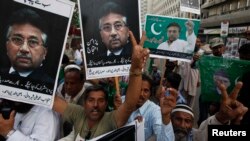A Pakistani court has ordered the government to lift a travel ban on former military ruler Pervez Musharraf, who faces charges of treason.
The court, on Thursday, approved Musharraf's request to have his name removed from an Exit Control List.
The court's order can not be executed for 15 days, which gives the government time to appeal.
The former military ruler has said he wants to visit his sick mother in Dubai.
Musharraf's lawyer, Farogh Naseem, said he is satisfied with the ruling.
"Yes, I am more than satisfied with the judgment given by a division bench of the Sindh High Court," Naseem said. "I think it is squarely in line with the settle principals of the constitution, law and international law that freedom of movement is a fundamental right and there can be no restriction on anyone's freedom of movement. Unless and until the person is actually convicted."
In March, Musharraf was indicted for treason.
The charge stems from his decision in 2007 to suspend the constitution and declare a state of emergency, in his bid to extend his disputed rule as president. If convicted, the 70-year-old former ruler could face the death penalty.
Musharraf seized power in a military coup in 1999 by ousting then prime minister Nawaz Sharif, and later forcing him into exile.
Musharraf stepped down in 2008 and went into self-imposed exile months later.
He returned to Pakistan last year to participate in the May elections, but was barred from doing so because of several legal challenges facing him.
The court, on Thursday, approved Musharraf's request to have his name removed from an Exit Control List.
The court's order can not be executed for 15 days, which gives the government time to appeal.
The former military ruler has said he wants to visit his sick mother in Dubai.
Musharraf's lawyer, Farogh Naseem, said he is satisfied with the ruling.
"Yes, I am more than satisfied with the judgment given by a division bench of the Sindh High Court," Naseem said. "I think it is squarely in line with the settle principals of the constitution, law and international law that freedom of movement is a fundamental right and there can be no restriction on anyone's freedom of movement. Unless and until the person is actually convicted."
In March, Musharraf was indicted for treason.
The charge stems from his decision in 2007 to suspend the constitution and declare a state of emergency, in his bid to extend his disputed rule as president. If convicted, the 70-year-old former ruler could face the death penalty.
Musharraf seized power in a military coup in 1999 by ousting then prime minister Nawaz Sharif, and later forcing him into exile.
Musharraf stepped down in 2008 and went into self-imposed exile months later.
He returned to Pakistan last year to participate in the May elections, but was barred from doing so because of several legal challenges facing him.







